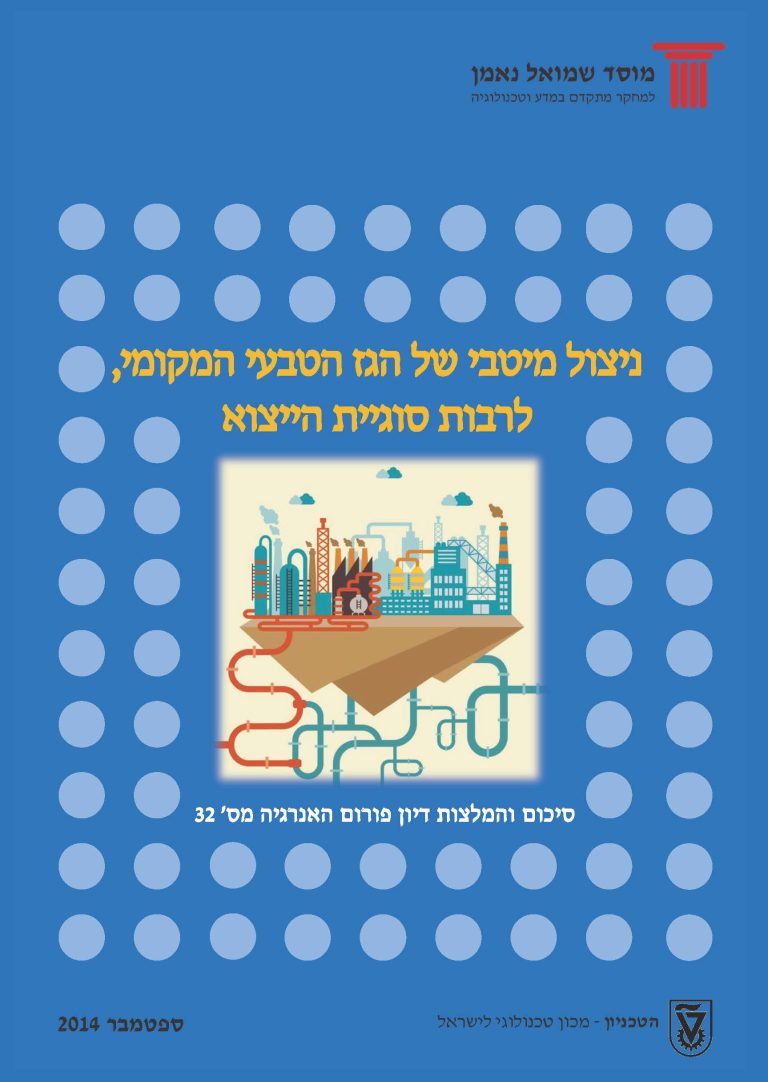Following the discovery of natural gas deposits offshore of Israel in recent years, the question arises: What is the optimal utilization of the gas from the viewpoint of the state of Israel and its people? Most of the discussions on this subject to date considered natural gas as fuel for producing heat and generating electricity. Indeed, this is the primary use of natural gas in the entire world today. However, there is another possibility that has not yet received sufficient attention in Israel – the utilization of gas as the basis for an export-oriented Israeli industry with high added value.
How to build an Israeli industry that is based upon natural gas? One option is the use of gas as a raw material for the chemical industry, where valuable substances can be produced, including ammonia, methanol, DME (Di-Methyl Ether), formaldehyde, hydrogen and more. The value of these materials may be higher, according to various estimates, by a factor of tens or even hundreds relative to that of the crude gas.
Another option is the integration of the Israeli technological industry in the international oil and gas industry, leveraging the capabilities of the Israeli industry in the field of technology and innovation for the development of solutions to the needs existing in the oil and gas industry worldwide. In these areas, the vast knowledge accumulated by the Israeli industry can be used in parallel or overlapping issues. For example, there is a similitude between the water-supply system and gas supply pipelines. Both require measurement equipment, telecommunications for the transmission and processing of data, etc., areas in which Israel has a broad base of knowledge.
A consensus exists among the majority of the Forum participants regarding the opportunity posed by the natural-gas sources for establishing a gas-based downstream industry. Most participants agree on the potential to develop a growth engine for the Israeli technological industry and its integration in the global oil and gas industry. Regarding the development of downstream industry on the subject of gas services, the forum members unanimously agree. In their view, emphasis should be placed on areas in which Israel can offer unique advantages. Indeed, the service industry does not need government subsidies and price control on gas. However, there are some reservations regarding the development of a natural gas-based petrochemical industry. The establishment of such an industry requires both cheaper gas prices (as raw material) and price controls. Under the current prices in Israel, the establishment and maintenance of a competitive downstream industry is doubtful. Many have estimated that the price of gas for this purpose should be below 4$/MMBtu. Under these conditions, it would be difficult to find entrepreneurs willing to invest in the development of this industry.
The solution (if the establishment of enterprises as stated is at all economically feasible) can be found in government investment and involvement, which may bear fruit in the future, as has been done in a few other places worldwide. Others, however, argued that government intervention is risky and is appropriate for third-world countries, but not for Israel. The main challenge of integrating the Israeli technological industry in the international oil and gas industry is its connection to global centers of knowledge in this market, identifying the existing technological needs and gaps and developing solutions accordingly.
In addition, there is a room to examine the use of gas for transportation in the form of CNG for cars or LNG for heavy vehicles. This sector will allow Israel to increase its energy security through supply. It can be highly economical if the price of gas is actually less than 50% of the price of an oil barrel based on calorific value.












